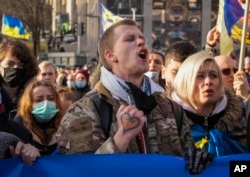Western media outlets have been eager to explain in sweeping geopolitical terms why Ukraine matters — presumably fearing readers and audiences might think the fate of a far-flung country on the edge of Europe has no significance for them.
But they might be preaching to the converted, according to a poll for the European Council on Foreign Relations. The survey published last week found Europeans may be experiencing a “geopolitical awakening,” according to analysts at the pan-European think tank.
Europeans are notably united on three key ideas.
Those surveyed identified the Russian threat as a problem not solely for Ukraine but for the security of the continent as a whole; they fear Russia is indeed plotting to invade Ukraine, despite Kremlin denials and its ridiculing of Western anxiety; and they want NATO and the European Union to respond to the crisis.
They remain less united, though, about what price their countries should pay to defend Ukraine or what sacrifices they are ready to suffer, with a noticeable east-west split. Poles, Romanians, and Swedes appear more willing than western counterparts to make sacrifices, although as a whole the study found Europeans are braced for a possible influx of large numbers of war refugees, much higher energy costs, Russian economic retaliation for Western sanctions and disruptive Kremlin-directed cyber-attacks.
The survey was conducted in Finland, France, Germany, Italy, Poland, Romania, and Sweden – which together account for almost two-thirds of the EU’s population. More than half of those polled agree that Russia represents a threat to Europe as a whole.
Recognizing Ukraine
Ivan Krastev and Mark Leonard, analysts at the ECFR, say there’s “a surprising consensus” among European voters, who “would see another Russian invasion of Ukraine as an attack on not just a neighboring country, but on the European security order itself.”
That may surprise Russian leader Vladimir Putin, they add. Indeed, it might. The Russian leader has long pushed a narrative that Ukraine is part of Russia. He famously declared to then-U.S. President George W. Bush in 2008: “You have to understand, George, that Ukraine is not even a country.”
In 2014, after annexing Crimea and using armed proxies, later backed by the Russian military, to seize part of Ukraine’s Donbas region, Putin said: “Russians and Ukrainians are one people. Kyiv is the mother of Russian cities.”
Last year he wrote a contentious 5,000-word tract entitled “On the Historical Unity of Russians and Ukrainians,” arguing that Ukraine can only be sovereign in partnership with Russia, and painted a picture of a Western conspiracy to undermine Slavic unity. Many authoritative historians dismissed Putin’s history lesson as eccentric and an exercise in mythmaking, one that simplified Ukraine’s much more complex, turbulent, and tortured story.
But the ECFR poll highlights how Europeans identify Ukraine as a fully-fledged country, a far cry from more dismissive Western attitudes of the past.
In 1991, George W. Bush’s father, in what came to be dubbed the “Chicken Kyiv” speech, urged Ukrainians not to declare independence, as the Soviet Union collapsed, but to remain united with Russia.
“Six years after independence, many otherwise well-informed Westerners have either completely failed to register that they have a country called Ukraine as a neighbor or have vaguely heard of it but have no idea where it is,” complained British writer Anna Reid in her book “Borderland: A Journey Through the History of Ukraine.”
Ukraine’s dramatic Maidan uprising in 2014, known also as the Revolution of Dignity, changed that, catching the attention and imagination of Europeans and putting the country on the map. Trade and cultural contacts have increased dramatically since the Maidan revolt; since 2017 Ukrainians have not needed to secure visas to visit the EU’s Schengen Zone, and tens of thousands of Ukrainian youngsters a year elect to study in the EU.
And Ukraine’s efforts in state and nation-building since the toppling in 2014 of Putin ally Viktor Yanukovych have registered, too, with, as the ECFR poll suggests, a continent-wide understanding of why Ukraine’s sovereignty and survival means a lot for other liberal democracies, especially near neighbors such as Poland and the Baltic States.
Buffer state
For Poland, which is home to around a million Ukrainians, mainly economic migrants, Ukraine matters as a buffer state which, as long as it survives, keeps Russia further away by nearly another 1,000 kilometers. Poland was the first country to recognize Ukraine after its 1991 independence referendum. Poles, like their counterparts in the Baltic States, fear a revanchist Russia on the grounds that if one border is crossed, others will be too.
The importance of Ukraine for Poland has been emphasized by the country’s Prime Minister Mateusz Morawiecki, a former historian.
“Europe is on the verge of war,” he warned Saturday. “Military conflict is no longer an unlikely scenario. It is a real option. For many generations of young Poles and Europeans, this is the closest they will have come to seeing such a scenario play out.
“For years, the West has trusted that the twenty-first century would be free of armed confrontation. Recent experience, however, provides sufficient evidence that Russian aggression is no illusion but a sign that a new chapter is opening in the history of the West.”





